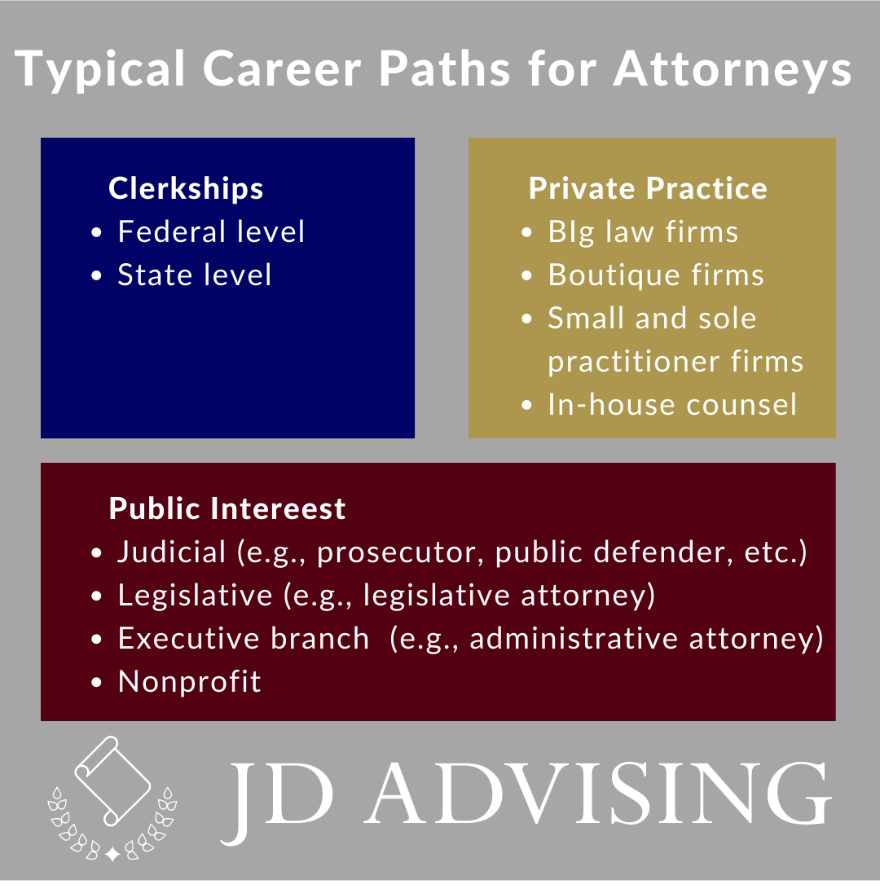Clerkships vs. Public Interest vs. Private Practice
Clerkships vs. Public Interest vs. Private Practice: What Should I Do?
Deciding on a legal career path can be a challenging endeavor. There are so many options, it can be challenging to figure out where to begin! There are so many different legal career paths you can take as a new lawyer. Law school is a great time to experience different career paths so you can figure out what best suits you. Check out the article below to help you through the process of deciding whether a clerkship, a job in private practice, or a public interest career is right for you.
Clerkships vs. Public Interest vs. Private Practice: What Should I Do?

Clerkships
Judicial clerkships are a great way to launch your legal career. Clerking for a judge is an excellent way to learn how to apply the law and to sharpen your writing skills. It can also bring along some networking opportunities as, depending on the type of clerkship, you might find yourself interacting with a number of other attorneys. Often, graduating law students can move right into a clerkship after graduation and can begin work before receiving bar exam results.
There are different levels of clerkships such as federal courts, state supreme courts, state appellate courts, and local circuit, family, and district courts. While federal clerkships are more competitive, any judicial clerkship will look impressive on your legal resume. Additionally, full-time judicial clerkships offer government benefits such as health insurance, holiday pay, and sick leave. Some attorneys become professional clerks and maintain these positions for years, or use it as a stepping stone for another government job or even a political career. Other law school graduates accept term judicial clerkships and work in a particular jurisdiction for 2-3 years (or more or less!).
Federal Clerkships
Federal clerkships, however, can be highly competitive and tend to require a strong grade point average coupled with summer legal experience. Due to the intensity of the work, judges and justices look for candidates who have a track record for being hardworking and ambitious. If a federal clerkship interests you, it is never too early to start the process through OSCAR, the online program for clerkship application and review. Although the application process is competitive and intense, OSCAR provides a number of resources to assist law students, such as training videos, reference guides, and a help desk. Your law school career services office can also be a valuable resource to help you navigate OSCAR!
State/Local Clerkships
State-level and local judicial clerkships vary as to competitiveness and the responsibilities of these judicial clerks vary from court to court. If you’re thinking of pursuing a local-level clerkship, make sure to take care and ask questions regarding responsibilities, benefits, and compesnation since these can vary widely depending on location!
Lastly, when considering whether a judicial clerkship will be a good fit for you, be sure to reach out to your law school career services department. They may be able to connect you with alumni who currently work or have served in a judicial clerkship. This will give you the opportunity to ask questions and help you make a more informed decision as to whether a clerkship is right for you.

Public Interest
If a judicial clerkship is not a good fit, but you still want to work in the public sphere, there are numerous public service opportunities available to new attorneys. Some of these are readily available to entry-level attorneys while others require more experience. Staff attorney positions can be found in every level of government from courts to legislative and executive branch offices.
Courts
There are a number of options available for law students to work for the court system outside of judicial clerkships. These positions include–but are not limited to!–prosecuting attorneys, public defenders, and assistant attorneys general. Many courts also have specialized positions available for attorneys interested in specific areas of the law such as family law and child welfare law. For example, Michigan has a branch of the family court called the “Friend of Court” to enforce child support and custody orders. You will find a number of attorneys working in these offices as referees and program directors.
Politics
If you are interested in getting involved in politics, there are many opportunities in local, state, and federal government. Most state legislatures have staff attorney positions that are involved in bill writing, committee work, and statute review. These jobs may lead to a role with a political party or a lobbying firm that work closely with the government in the political realm. Additionally, political parties have their own policy staffs that help draft and research legislation.
Executive Branch
Many of the agencies within the state and federal government have attorney positions. If, for example, you are interested in the environment, check with the Department of Natural Resources on the state or federal level to see what opportunities are available. Other options are the Department of Labor, the Department of Health and Human Services, and the Department of Justice. Each agency is looking for attorneys who are interested in a specific area of the law, and this can be an excellent way to begin your career.
Legal Adjacent Careers
Rather than becoming a traditional legal practitioner, some students may be interested in pursuing a different legal career path in a “legal adjacent” or “Juris Doctor Preferred” job. These jobs do not require a juris doctor but involve critical thinking and other skills that students pick up throughout a law school career. You will find these jobs in non-profit corporations, the executive branch of the government, in financial services, and in human resources. While having a juris doctor is not a requirement, it can be extremely beneficial for the candidate to have working legal knowledge of issues that arise in these fields. Additionally, a juris doctor can sometimes put you on a fast track for other career advancements.

Private Practice
Many law students focus on obtaining a post-graduate position at a law firm that specializes in an area of law that interests them. Law firms range in size and areas of practice. Some law firms may have only 1-2 practitioners and offer a pathway to ownership while others may have hundreds or thousands of attorneys across their network. As you consider pursuing a job at a law firm, it is important to understand the differences between different types of firms so you can better gauge what will be the best fit.
Big Law Firms
Big law firms often start hiring by selecting law clerks during most students’ 1L summer or 2L fall by conducting on-campus interview. Depending on performance, these clerkships can lead to associate attorney positions with a big law firm. As an associate, you will work with a large team of attorneys researching and writing legal memoranda and briefs. You will likely not see courtroom work at the start of your career with a big law firm unless you are working under a more established attorney. Big law firms typically have a set partner track, and you’ll know whether you are in a “partner track” position upon hire. While the hours are long and the work is often stressful, the high salaries offered by big law firms tend to be very attractive to new attorneys.
Boutique Firms
Boutique law firms tend to earn that classification because of their small structure and their niche practice areas. While smaller, these firms tend to follow a traditional partnership structure (although, not all do, so it’s important to check!). Boutique law firms can be an excellent to build your skillset in a particular area of the law. With smaller staffs, you might find yourself getting hands-on experience faster than you otherwise would in a Biglaw or even a medium-sized firm.
Small and Sole Practitioner Firms
If big law or larger firms seem intimidating, a small firm or starting your own business might be the best option for you. A small firm with 2-3 attorneys will give you a balance of working with more experienced attorneys but being able to get your feet wet with client counseling, brief writing, and courtroom appearances. If the firm is looking to expand, you might be able to serve in a direct role that can further that expansion. Every small firm has its own path to partnership, and some small firms don’t offer any partnership opportunities.
Another option available is to open your own firm as a sole practitioner. To do this, make sure to seek out resources from the state bar and a good mentor or two (or ten!) to learn how to best start this process. The financial side can be tricky, and you want to make sure you start off on the right foot ethically and otherwise. As a sole practitioner, you will be your own boss in charge of building your client base, networking, legal research, and writing. Being a sole practitioner is incredibly hard work with long hours and low to no salary as you build your business.
In-House Counsel
Another option is to seek an in-house counsel attorney job at a bank, corporation, academia, or other business organization. These jobs focus on legal issues surrounding the entity that range from human resources issues to contract creation and review. In-house jobs provide exposure to a wide range of legal issues, so if you are looking for variety, this might be a good option for you. In-house jobs typically have benefits that align with what positions in a particular tiered group receive.
Moving Forward
The most important thing to remember when taking the first steps in your legal career is that you can always change your mind and shift paths. If you start out working for a private practice law firm and find that it is not right for you, you can always switch gears and move into a public interest position. Likewise, if you have your heart set on being a prosecutor but find private practice is more your style, you can make that shift. There are so many different legal career paths that you are sure to find something that interests you!
Looking to Pass the Bar Exam?
Free Resources:
- 🌟Bar Exam Free Resource Center: Access our most popular free guides, webinars, and resources to set you on the path to success.
- Free Bar Exam Guides: Expert advice on the MBE, the MEE, passing strategies, and overcoming failure.
- Free Webinars: Get insight from top bar exam experts to ace your preparation.
Paid Resources:
- 🏆One-Sheets: Our most popular product! Master the Bar Exam with these five-star rated essentials.
- Bar Exam Outlines: Our comprehensive and condensed bar exam outlines present key information in an organized, easy-to-digest layout.
- Exclusive Mastery Classes: Dive deep into highly tested areas of the MBE, MEE, MPT, and CA bar exams in these live, one-time events.
- Specialized Private Tutoring: With years of experience under our belt, our experts provide personalized guidance to ensure you excel.
- Bar Exam Courses: On Demand and Premium options tailored to your needs.
- Bar Exam Crash Course + Mini Outlines: A great review of the topics you need to know!
🔥 NEW! Check out our Repeat Taker Bar Exam Course and our new premier Guarantee Pass Program!







Leave a Reply
Want to join the discussion?Feel free to contribute!